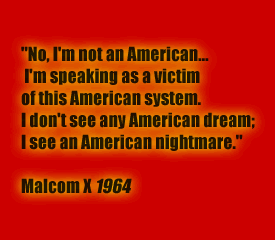|
|
|

The Second Reconstruction, 1962-1967
TOPICS >>>
Black Freedom Movement, 1960s:
Albany desegregation campaign,
1962
March on Washington, 1963
Birmingham campaign, 1963
CORE's demonstration at NYC's World's Fair, 1964
Johnson signs Civil Rights Act, 1964
Voting Rights Act, 1965
Open Housing Act, 1968
War on Poverty, 1965
Civil Rights Act of 1964
Voting Rights Act of 1965
Kennedy's Assassination, November 22, 1963
Lyndon Johnson's landslide election, November, 1964
Urban uprisings/riots, 1964-1972
March on Washington, D.C.,
August, 1963, "I Have a Dream" Speech
Criticisms of King's role: Harold Cruse, SNCC, CORE, NAACP
The impact of the Civil Rights
Movement on the formation of the Black
Middle Class; the impact on the urban poor
Poor People's Movements:
Frances Fox Piven and Richard
Cloward
How did the struggles for civil rights impact the poor?
Old Age Assistance; Aid to the Blind; Aid to Families with Dependent
Children (AFDC); FDR's administration, 1935
Aid to the Permanently and Totally Disabled, 1950
War on Poverty, announced January, 1964
Economic Opportunities Bill--1964; Juvenile Deliquency and Youth
Offenses and Control Act
Daniel Patrick Moynihan, The Negro Family: The Case for National Action,
1965;
"Tangle of Pathology," "Black Matriarchy" theses
National Welfare Rights Organization; George Wiley
Edwin Day, Poverty Rights Action Center
Problems inherent in mobilizing poor people for social programs, benefits
The dilemma for reformers:
How to uproot institutional
racism when all white Americans benefited
(in varying degrees) from inequality?
READINGS >>>
Marable, Race,
Reform and Rebellion, Chapter
IV, "We Shall Overcome, 1960-1965," pp. 61-85.
Williams, Eyes
on the Prize: America's Civil Rights Years, 1954-1965,
Chapter VI, "Freedom in the Air: The Lessons of Albany and Birmingham,"
pp. 163-205; Chapter VII, "Mississippi: Freedom Has Never Been Free,"
pp. 207-249; and Chapter VIII, "Selma: The Bridge to Freedom," pp. 251-287.
Marable and Mullings, eds.,
Let Nobody Turn Us Around,
Section Four, Numbers 8-16, pp. 407-468.
MULTIMEDIA >>>
Music:
SNCC Freedom Singers - "We
Shall Overcome"
Sweet Honey in the Rock - "Ain't
Gonna Let Nobody Turn Us Around"
Sam Cooke - "A
Change is Gonna Come"
Speeches:
Martin Luther King, Jr. - "I
Have a Dream"
Martin Luther King,
Jr. - "I've
Been to the Mountaintop"
Malcolm X - "White
Man's Disease"
Malcolm X - "The
Ballot or the Bullet"
Films: News clips of
leaders and major protest campaigns Ð Birmingham, 1963 March on Washington;
Mississippi Freedom Summer Campaign, 1964; Selma to Montgomery March,
1965. Clip from Spike Lee's film Malcolm X on Nation of Islam phase of
Malcolm's life. Sidney Poitier, Guess Who's Coming to Dinner?, 1967
|










